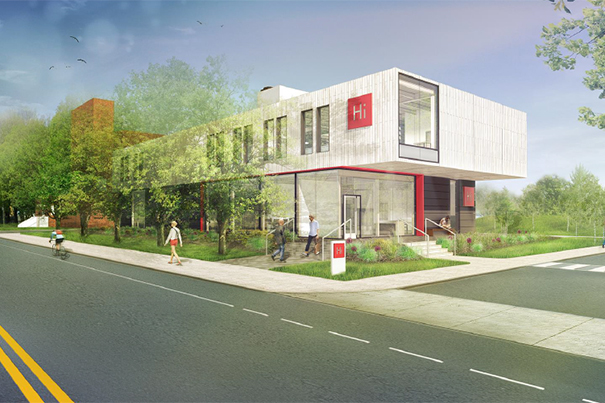
The Life Lab, scheduled to open this fall on Harvard’s Allston campus, will offer shared laboratory space for high-potential life sciences and biotech startups established by Harvard faculty, alumni, students, and postdoctoral scholars.
Rendering courtesy of Shepley Bulfinch
Boston approves Harvard’s Life Lab
Shared lab space will give Allston major boost among startup communities, attracting Harvard faculty, students, scholars, and alums
The Boston Redevelopment Authority (BRA) gave final approval Thursday to Harvard University’s Life Lab in Allston.
The Harvard Life Lab, which is scheduled to open this fall, will offer shared laboratory space for high-potential life sciences and biotech startups established by Harvard faculty, alumni, students, and postdoctoral scholars. It will also provide learning and career development opportunities to Harvard students; equip scientific startups with the lab resources and programming needed to grow and scale life-science ventures; and, through collaboration, generate insights and expertise to support Harvard’s ongoing efforts to build a successful life-science environment. Together with the Harvard Innovation Lab (i-lab) and Launch Lab, the Life Lab will foster the cross-disciplinary approach to entrepreneurship that will enable deeper impact and outcomes.
“We are very excited to have received the approval from the Boston Redevelopment Authority to begin construction on the Harvard Life Lab,” said Jodi Goldstein, the Bruce and Bridgitt Evans Managing Director of the Harvard Innovation Labs. “This project is a pivotal step in making Allston one of the most robust startup communities in the region.”
The 15,000-square-foot facility will have fully equipped and permitted laboratory and office space for early stage companies, and will be located on Harvard’s Allston campus, adjacent to the i-lab and Launch Lab. One of the Life Lab’s goals is to contribute to building a thriving startup community in Allston by seeding the campus with early stage scientific ventures.
Since it was opened in 2011 by President Drew Faust and Harvard Business School Dean Nitin Nohria, the i-lab has attracted students and faculty from across the University, some of whom want to pursue research in the life sciences that sometimes requires wet-lab facilities. Wet labs are equipped to provide direct ventilation for isolated testing of certain materials.
“The Harvard Life Lab gives Harvard students and other members of the University an opportunity to participate in biotech and other life-sciences ventures as part of the expanding Allston campus that already houses the i-lab and the alumni-focused Harvard Launch Lab. It will provide an experiential, educational environment in which students and faculty can put classroom ideas directly into practice,” Goldstein said. “We are looking forward to being able to provide a home for Harvard life-sciences startups when the Life Lab opens its doors this fall.”
The Life Lab facility has been designed to allow for the potential relocation of the space in a five- to 10-year time frame.
Thursday’s approval of the Life Lab comes at an exciting time amid Harvard’s ongoing campus development in Allston, and further highlights the University’s strong partnership with the community, according to Kevin Casey, associate vice president of Harvard Public Affairs and Communications.
“The Harvard Life Lab will continue to build Allston’s growing reputation as a hub of entrepreneurship, and will contribute to the local community through impactful partnerships with Boston Public Schools and the Harvard Ed Portal,” said Casey.
In consultation with the community and the city, Harvard is creatively implementing programs and physical improvements across Allston-Brighton, and is committed to continuing to bring the University’s greatest strengths — teaching and research — directly to the community, he added.
The Life Lab has pledged to provide a one-time grant totaling more than $60,000 to fully fund the purchase of Chromebook laptops, providing every Allston-Brighton public school student access. It also plans to sponsor science, technology, engineering, and math (STEM) workshops for local residents, and participate in a speaker series at the i-lab on topics relevant to the intersection of entrepreneurship and life sciences. Together with the i-lab and Launch Lab, the Life Lab will also host an annual free event for the entire community beginning this fall.
Because the University is dedicated to fostering a collaborative environment for research, innovation, and economic development, the Life Lab will benefit from its proximity to not only the i-lab and Launch Lab, but also to Harvard Business School and the planned Science and Engineering Complex, which will be the new location of the John A. Paulson School of Engineering and Applied Sciences.




